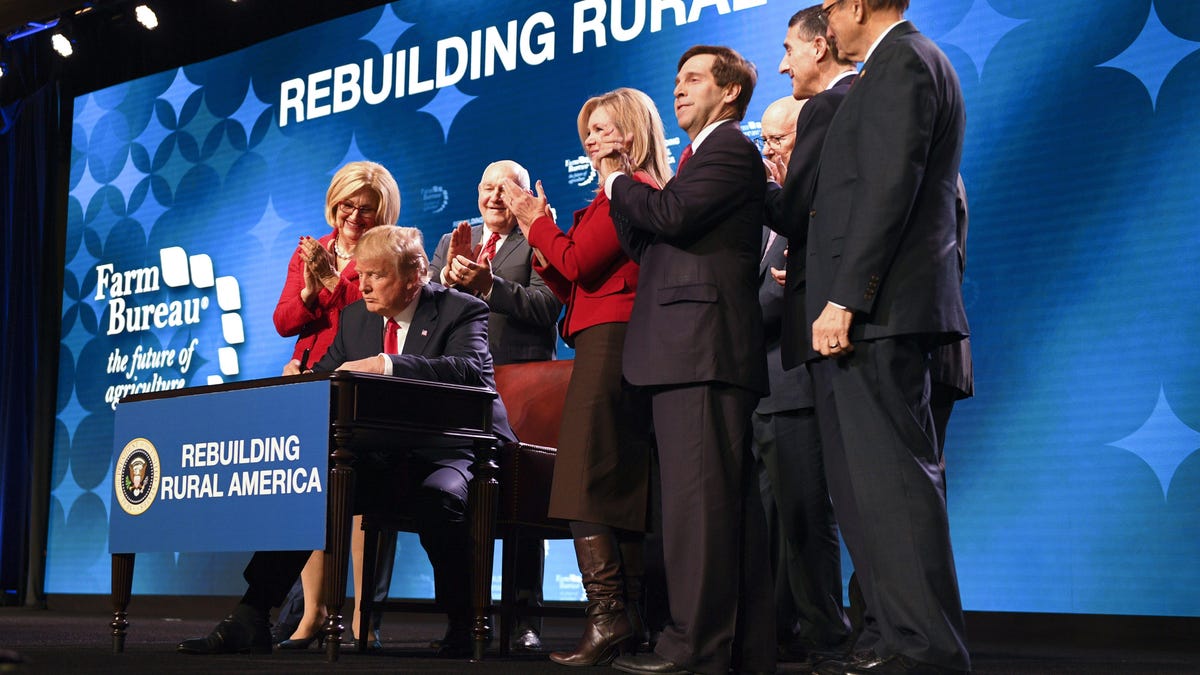Trump pushes for broadband expansion in rural areas
The president signs executive order intended to make it easier for private companies to deploy high-speed broadband infrastructure in farm country.

President Donald Trump signed an executive order Monday aimed at making it easier for companies to deploy high-speed broadband networks in rural areas.
Speaking at the annual convention of the American Farm Bureau Federation in Nashville Monday, Trump unveiled and then signed a presidential order that expedites federal permitting to allow broadband expansion in rural areas and makes it easier for wireless operators to put cell towers on federal lands.
"Those towers are going to go up and you are going to have great, great broadband," Trump said in his speech.
The order is based on recommendations in a new report issued by the Task Force on Agriculture and Rural Prosperity. The Federal Communications Commission estimates 39 percent of people living in rural regions do not have access to broadband, compared with just 4 percent of people in cities.
The reason is simple. In sparsely populated areas, it's not economical for private industry to deploy infrastructure. It's not a new problem or suggested solution. The Obama administration made similar suggestions two years ago.
Trump's proposal doesn't offer new funding to promote broadband deployment in rural areas. Instead, the administration is focused on establishing policies to "get government out of the way" as companies look to deploy fiber links and high-speed wireless technologies to serve these areas.
The FCC is led by Republican Chairman Ajit Pai, who is from rural Kansas and has also been working to make it easier for companies to cut through red tape in order to deploy more network infrastructure in rural areas. Pai has argued that his controversial move to repeal Obama-era net neutrality rules, which imposed utility-style regulation on broadband networks, will also help encourage investment in rural broadband infrastructure. But there is little evidence to suggest that a change in regulation will spur massive investment in rural infrastructure.
Competitive Carrier Association President Steven Berry, whose organization represents rural providers, applauded the task force's report and the Trump administration's efforts.
"The report rightly recognizes the unfortunate truth that many rural areas remain unserved and underserved, creating a digital divide throughout the country," he said. "I commend the administration for its work to streamline permitting processes, and especially for allowing infrastructure builds on federal facilities. There is no question federal lands are an important part of our country and providing seamless coverage in these areas is just as important as any other location, especially during times of emergencies."
Trump has enjoyed widespread support in rural areas of the country, which strongly supported him in the 2016 election over Hillary Clinton. And he introduced the new policies as he also touted the $1.5 trillion tax overhaul bill he signed into law last month, which many say provides generous tax cuts to corporations and favors wealthier Americans. But on Monday, Trump highlighted how the new Republican tax plan benefits working families, small businesses and family farmers.
He pointed to reforms to the estate tax as a way to ensure family farms can be passed down to the next generation, and provisions in the legislation that will allow farmers to deduct the entire cost of new equipment in the first year of their investment. And he said the new broadband proposals will ensure American farmers are no longer left behind economically.
"In every decision we make," he said, "we are honoring America's proud farming legacy."
Tech Enabled: CNET chronicles tech's role in providing new kinds of accessibility.
Special Reports: CNET's in-depth features in one place.

